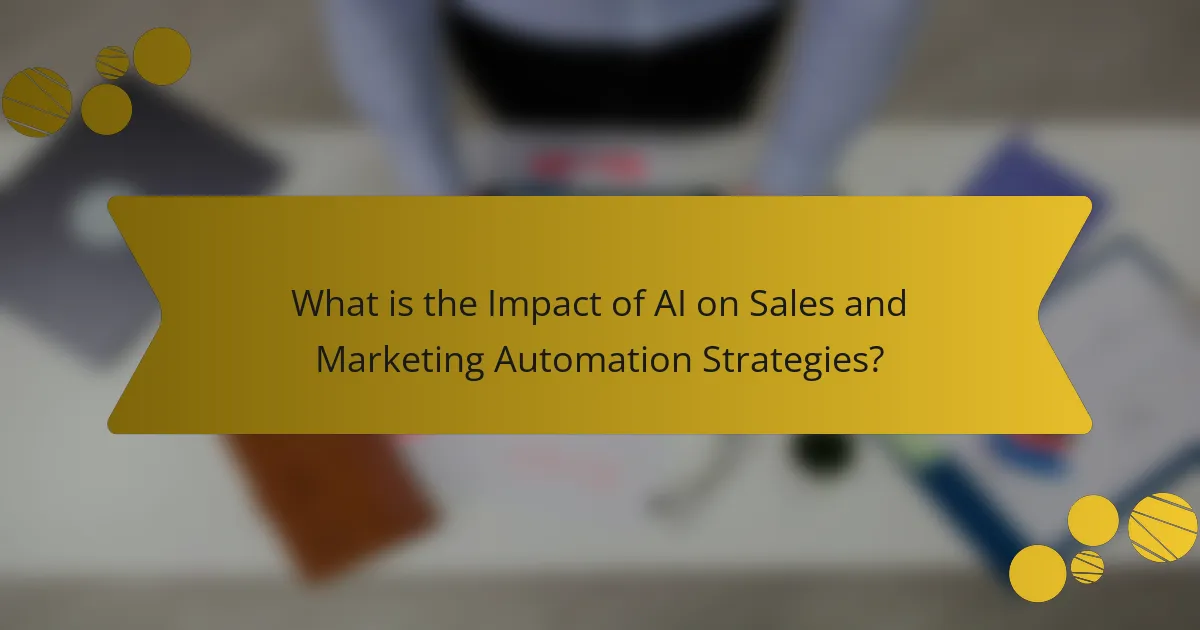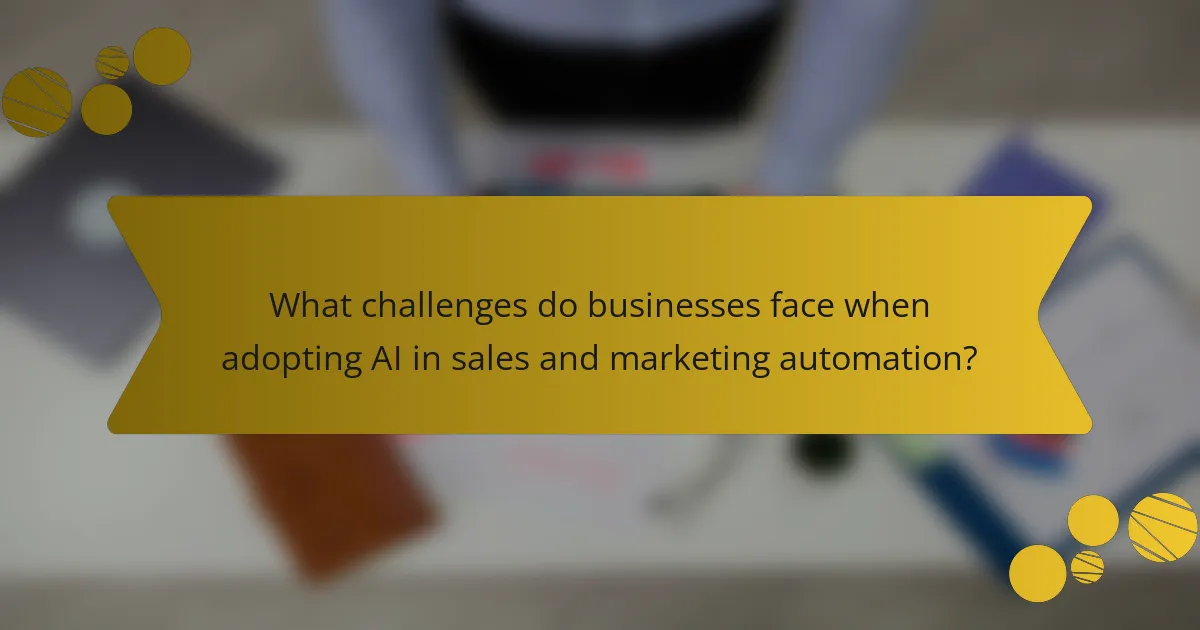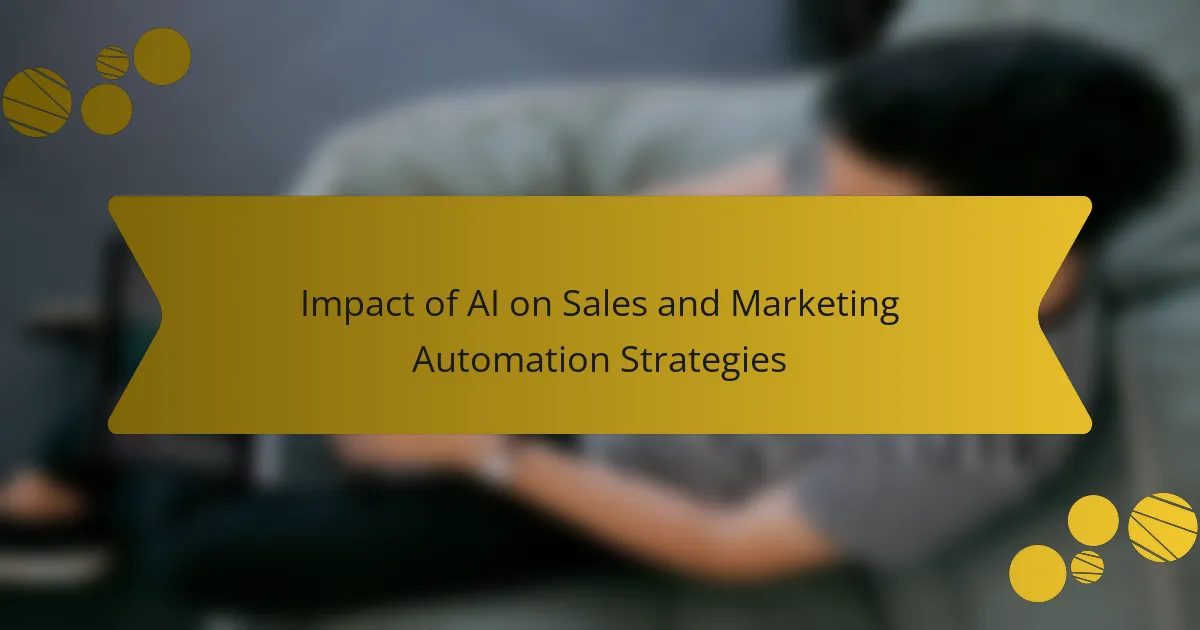Artificial Intelligence (AI) plays a crucial role in enhancing sales and marketing automation strategies, driving data-driven decision-making and personalized customer experiences. AI algorithms analyze consumer behavior to predict trends, optimize campaigns, and streamline repetitive tasks, resulting in improved efficiency. However, businesses face challenges in adopting AI, including data quality issues, system integration difficulties, a shortage of skilled personnel, and ethical concerns regarding data privacy. Future trends indicate a shift towards increased personalization, enhanced data analytics, and improved customer engagement through AI-driven tools. These developments suggest that companies leveraging AI can significantly boost their productivity and profitability in marketing.

What is the Impact of AI on Sales and Marketing Automation Strategies?
AI significantly enhances sales and marketing automation strategies. It allows for data-driven decision-making and personalized customer experiences. AI algorithms analyze consumer behavior to predict trends and optimize campaigns. Automation tools powered by AI can streamline repetitive tasks, improving efficiency. According to a report by McKinsey, companies that leverage AI in marketing can increase their productivity by 20-30%. Additionally, AI enables real-time analytics, allowing businesses to adjust strategies promptly. This adaptability leads to higher conversion rates and customer satisfaction. Overall, AI transforms sales and marketing by making processes smarter and more efficient.
How has AI transformed traditional sales and marketing practices?
AI has transformed traditional sales and marketing practices by enhancing data analysis and customer targeting. It enables businesses to analyze vast amounts of consumer data quickly. This leads to more personalized marketing strategies. AI-driven tools can predict customer behavior with high accuracy. For instance, 61% of marketers say AI improves customer engagement. Automation of repetitive tasks has increased efficiency in sales processes. Chatbots and virtual assistants provide 24/7 customer support. This shift allows sales teams to focus on building relationships rather than administrative tasks. AI’s ability to optimize ad spend has also improved return on investment.
What specific AI technologies are influencing sales and marketing automation?
Machine learning, natural language processing, and predictive analytics are specific AI technologies influencing sales and marketing automation. Machine learning algorithms analyze customer data to improve targeting and personalization. Natural language processing enables chatbots and virtual assistants to enhance customer interactions. Predictive analytics forecasts customer behavior, helping businesses optimize their marketing strategies. These technologies collectively streamline processes and enhance decision-making in sales and marketing. For example, a study by McKinsey found that companies using AI in marketing saw a 10-20% increase in sales.
How do these technologies integrate with existing systems?
AI technologies integrate with existing systems through APIs and middleware solutions. These tools allow seamless data exchange between different software platforms. For example, CRM systems can connect with AI-driven analytics tools to enhance customer insights. This integration improves data accuracy and operational efficiency. Additionally, many AI solutions are designed to work with existing databases and applications. They can analyze historical data and provide predictive insights. This capability enables businesses to make data-driven decisions. Integration also supports automation of repetitive tasks, freeing up human resources for strategic activities. Overall, these technologies enhance existing workflows and drive better outcomes in sales and marketing.
What are the key benefits of implementing AI in sales and marketing automation?
Implementing AI in sales and marketing automation enhances efficiency and effectiveness. AI streamlines repetitive tasks, allowing teams to focus on strategic activities. It improves lead scoring by analyzing data patterns to identify high-potential customers. AI-driven analytics provide insights into customer behavior, enabling personalized marketing strategies. Automation tools powered by AI can optimize ad placements and budget allocation in real-time. According to a report by McKinsey, companies using AI in marketing saw a 10-20% increase in conversion rates. Overall, AI implementation leads to better resource allocation and higher return on investment.
How does AI improve customer targeting and segmentation?
AI enhances customer targeting and segmentation by analyzing vast amounts of data quickly. It identifies patterns in customer behavior and preferences. This allows businesses to create detailed customer profiles. AI algorithms can segment customers based on demographics, purchasing history, and engagement levels. For example, a study by McKinsey found that companies using AI for customer segmentation can increase their marketing efficiency by up to 30%. AI also enables real-time adjustments to marketing strategies based on customer interactions. This leads to more personalized marketing efforts, improving conversion rates and customer satisfaction.
What role does AI play in enhancing customer engagement and experience?
AI significantly enhances customer engagement and experience by personalizing interactions. It analyzes customer data to provide tailored recommendations. This leads to increased satisfaction and loyalty. AI chatbots offer 24/7 support, answering inquiries promptly. According to a study by Salesforce, 69% of consumers prefer chatbots for quick responses. AI also predicts customer behavior through machine learning. This allows businesses to anticipate needs and adjust strategies accordingly. Furthermore, AI-driven analytics help companies understand customer preferences better. This data-driven approach improves marketing effectiveness and customer retention.

What challenges do businesses face when adopting AI in sales and marketing automation?
Businesses face several challenges when adopting AI in sales and marketing automation. Data quality is a primary issue. Inaccurate or incomplete data can lead to ineffective AI models. Integration with existing systems poses another challenge. Many businesses struggle to seamlessly incorporate AI tools into their current workflows. Additionally, there is a lack of skilled personnel. Companies often find it difficult to hire or train staff proficient in AI technologies. Change management can also hinder adoption. Employees may resist new processes and technologies. Finally, ethical concerns regarding data privacy impact AI implementation. Businesses must navigate regulations while ensuring customer trust.
What common obstacles hinder AI implementation in these strategies?
Common obstacles that hinder AI implementation in sales and marketing automation strategies include data quality issues, lack of skilled personnel, and integration challenges. Poor data quality can lead to inaccurate AI predictions and ineffective campaigns. A shortage of skilled personnel limits the ability to develop and manage AI systems effectively. Integration challenges arise when existing systems do not easily connect with new AI technologies. Additionally, budget constraints can restrict investment in necessary AI tools and training. Resistance to change within organizations can also impede the adoption of AI solutions. According to a 2022 report by McKinsey, 70% of organizations cite these factors as significant barriers to successful AI implementation.
How can businesses overcome data privacy and ethical concerns?
Businesses can overcome data privacy and ethical concerns by implementing robust data governance frameworks. These frameworks should include clear policies for data collection, storage, and usage. Regular audits can ensure compliance with regulations like GDPR and CCPA. Training employees on data privacy best practices is essential for fostering a culture of accountability. Transparency with customers about data practices builds trust and enhances brand loyalty. Utilizing encryption and anonymization techniques protects sensitive information from unauthorized access. Additionally, businesses can engage third-party experts to assess and improve their data privacy measures. According to a 2021 survey by PwC, 79% of consumers are concerned about how companies use their data, highlighting the importance of addressing these issues.
What skills are necessary for teams to effectively utilize AI tools?
Teams need a combination of technical, analytical, and interpersonal skills to effectively utilize AI tools. Technical skills include proficiency in programming languages such as Python and knowledge of machine learning frameworks. Analytical skills are essential for interpreting data and deriving actionable insights from AI-generated outputs. Understanding data privacy and ethical implications is also crucial. Interpersonal skills facilitate collaboration among team members and effective communication of AI findings. Continuous learning and adaptability are vital due to the rapid evolution of AI technologies. According to a report by McKinsey, organizations that prioritize these skills see a 20% increase in productivity when implementing AI solutions.
How can organizations measure the effectiveness of AI in their sales and marketing efforts?
Organizations can measure the effectiveness of AI in their sales and marketing efforts through key performance indicators (KPIs). These KPIs may include metrics like conversion rates, customer acquisition costs, and return on investment (ROI). Tracking these metrics allows organizations to assess the direct impact of AI tools. Additionally, organizations can analyze customer engagement metrics, such as click-through rates and social media interactions. A study by McKinsey & Company found that companies using AI in marketing saw a 10-20% increase in sales effectiveness. Regularly reviewing these metrics provides insights into AI performance and areas for improvement.
What key performance indicators (KPIs) should be tracked?
Key performance indicators (KPIs) to track include conversion rates, customer acquisition cost, and customer lifetime value. Conversion rates measure the percentage of leads that become customers. Customer acquisition cost calculates the total cost of acquiring a new customer. Customer lifetime value estimates the total revenue generated from a customer over their engagement period. Other important KPIs are return on investment, sales growth, and engagement metrics. Return on investment assesses the profitability of marketing efforts. Sales growth indicates the increase in sales over a specific period. Engagement metrics evaluate customer interactions with marketing content. Tracking these KPIs provides insights into the effectiveness of sales and marketing strategies.
How can businesses analyze the ROI of AI-driven strategies?
Businesses can analyze the ROI of AI-driven strategies by measuring key performance indicators (KPIs) before and after implementation. Common KPIs include revenue growth, cost savings, and customer engagement metrics. They should track the initial investment costs associated with AI technologies. This includes software, hardware, and training expenses. Businesses must also evaluate the time saved in processes due to AI automation. Studies show that AI can increase productivity by up to 40%. Furthermore, analyzing customer satisfaction scores can provide insights into the effectiveness of AI applications. A positive shift in these scores indicates improved customer experiences, which can lead to higher retention rates. Lastly, comparing these metrics against industry benchmarks can help validate the effectiveness of AI strategies.

What future trends can we expect in AI and sales and marketing automation?
Future trends in AI and sales and marketing automation include increased personalization, enhanced data analytics, and improved customer engagement. Personalization will leverage AI to tailor marketing messages to individual preferences. Enhanced data analytics will allow businesses to gain deeper insights into customer behavior and market trends. Improved customer engagement will utilize AI-driven chatbots and virtual assistants for real-time support. According to a report by McKinsey, companies that effectively use AI in marketing can increase their profitability by 20%. These trends indicate a shift towards more automated, data-driven decision-making processes in sales and marketing.
How is AI expected to evolve in the sales and marketing landscape?
AI is expected to evolve by enhancing personalization and predictive analytics in sales and marketing. Advanced algorithms will analyze consumer behavior more effectively. This will lead to tailored marketing strategies that resonate with individual preferences. Automation tools will streamline repetitive tasks, allowing teams to focus on strategy. Machine learning will improve the accuracy of sales forecasts. AI-driven chatbots will provide immediate customer support, enhancing user experience. Research shows that 80% of companies will use AI for marketing by 2025. This trend indicates a significant shift towards data-driven decision-making in the industry.
What emerging technologies may further enhance these strategies?
Emerging technologies such as machine learning, natural language processing, and predictive analytics may further enhance sales and marketing automation strategies. Machine learning algorithms can analyze vast amounts of data to identify trends and optimize campaigns in real-time. Natural language processing enables better customer interactions through chatbots and personalized content. Predictive analytics helps in forecasting customer behavior and improving targeting efforts. These technologies collectively improve efficiency, personalization, and decision-making in marketing automation. According to a report by McKinsey, companies using AI in marketing see a 10-20% increase in sales.
How can businesses prepare for the future of AI in their operations?
Businesses can prepare for the future of AI in their operations by investing in AI training and technology. This includes upskilling employees to work alongside AI tools. Companies should also integrate AI into their existing systems for efficiency. Data management is crucial; businesses must ensure high-quality data for AI algorithms. Collaborating with AI experts can guide effective implementation strategies. Additionally, businesses should stay updated on AI advancements to adapt their strategies accordingly. Research indicates that organizations embracing AI can increase productivity by up to 40%. This highlights the importance of proactive preparation for AI integration.
What best practices should organizations follow when implementing AI in sales and marketing automation?
Organizations should follow several best practices when implementing AI in sales and marketing automation. First, they should clearly define their objectives and desired outcomes. Establishing specific goals helps in measuring success. Second, data quality is crucial. High-quality, relevant data ensures accurate AI predictions and insights. Third, organizations must invest in training for staff. Proper training enables teams to leverage AI tools effectively. Fourth, integrating AI with existing systems is essential. Seamless integration enhances workflow efficiency. Fifth, organizations should monitor AI performance continuously. Regular assessments help in optimizing algorithms and improving outcomes. Lastly, ethical considerations must be prioritized. Ensuring transparency and fairness builds trust with customers. These practices collectively enhance the effectiveness of AI in sales and marketing automation.
How can companies ensure successful integration of AI technologies?
Companies can ensure successful integration of AI technologies by establishing a clear strategy. This involves defining specific goals for AI usage. Companies should also invest in training staff to work with AI tools. Collaboration between IT and business units is essential for seamless integration. Regular assessments of AI performance can help identify areas for improvement. Additionally, securing data privacy and compliance is crucial. Research shows that 70% of companies that prioritize these factors report higher success rates in AI implementation.
What strategies can enhance team collaboration in AI initiatives?
Implementing clear communication protocols enhances team collaboration in AI initiatives. Establishing regular check-ins fosters transparency and accountability among team members. Utilizing collaborative tools like project management software streamlines workflows and improves task tracking. Encouraging cross-functional teams leverages diverse expertise, enriching AI project outcomes. Providing training on AI technologies equips team members with necessary skills. Setting common goals aligns efforts and drives collective success. Gathering feedback regularly promotes continuous improvement and adaptation. These strategies have been shown to increase project efficiency and innovation in AI initiatives.
The main entity of this article is the impact of AI on sales and marketing automation strategies. The article explores how AI enhances efficiency, personalization, and decision-making in these fields by analyzing consumer data, optimizing campaigns, and automating repetitive tasks. It discusses specific AI technologies such as machine learning and natural language processing, their integration with existing systems, and the benefits of implementing AI, including improved customer targeting and engagement. Additionally, the article addresses challenges businesses face when adopting AI, best practices for successful integration, and future trends in AI-driven sales and marketing.
